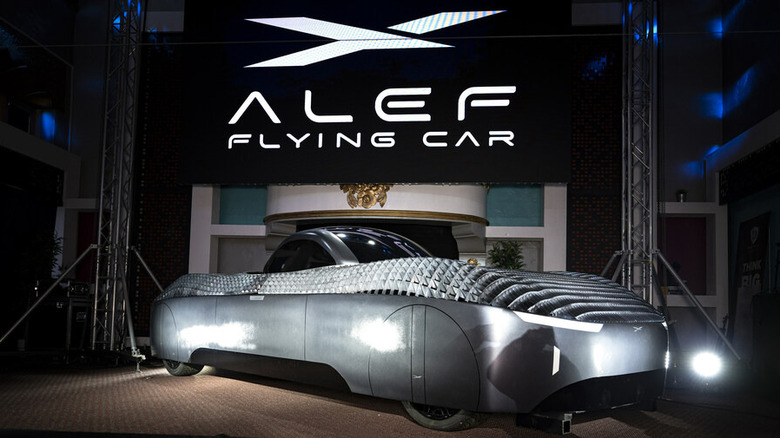What Does An FAA Certification Mean For Flying Cars?
Flying cars are one of those inventions that have been theorized for decades but never quite seem to come to pass. However, one company may be one step closer to making the airborne commute seen in "The Jetsons" a reality. This week, the Federal Aviation Administration (FAA) granted Alef Aeronautics a Special Airworthiness Certification, which will allow Alef to legally fly its Armada Model Zero, though it won't have free range to soar above traffic just yet.
Does the FAA certification mean that the government is ready to allow flying cars to enter the market? Not quite. Alef, a California startup inspired by the flying cars seen in "Back to the Future Part II," was awarded an "Experimental" Special Airworthiness Certificate, which is more restrictive than other types, like the "Restricted" and "Light-Sport" certificates. According to the FAA, its approval "allows the aircraft to be used for limited purposes, including exhibition, research, and development."
This is a big win for Alef, and not just because it will make research and development easier. Being able to showcase its prototype to the public and to potential investors, the company can generate both interest and money for the development of a flying car. Additional funding can help the project and others like it to become a reality. The momentum of public interest could also lead to the FAA one day giving its full approval for commuters taking off straight from their driveways.
Alef's flying car is still just a prototype
Even with the FAA certification, Alef has a long way to go to making its flying car a practical reality. Its Model A will likely have a payload of just 200 pounds, barely enough for one passenger and some baggage, though the company plans to expand the capacity of subsequent models. Meant to function as both a car on the road and a drone-like aircraft in the sky, its driving range is 200 miles and its flying range is 110 miles. That range is expected to be higher in a different prototype that will use hydrogen fuel cells rather than electric batteries.
Jim Dukhovny, CEO of Alef, says the FAA's certification allows the company to "move closer to bringing people an environmentally friendly and faster commute, saving individuals and companies hours each week. This is one small step for planes, one giant step for cars." Even with a $300,000 price tag, Alef is receiving pre-orders for its flying car, which it plans to bring to market in 2025. Now that the company has the FAA's approval, the supply could soon follow.
The car houses its passenger inside a bubble surrounded by eight propellers, which, like with a drone, can be used for vertical take-off. One side of the car's body becomes the top wing of the aircraft, while the other becomes the bottom. If that sounds both futuristic and highly ambitious, that's because it is. This transition to forward flight hasn't been tested with a human passenger yet, though with the FAA's limited approval and likely rounds of additional funding, Alef will presumably test the design at some point.

